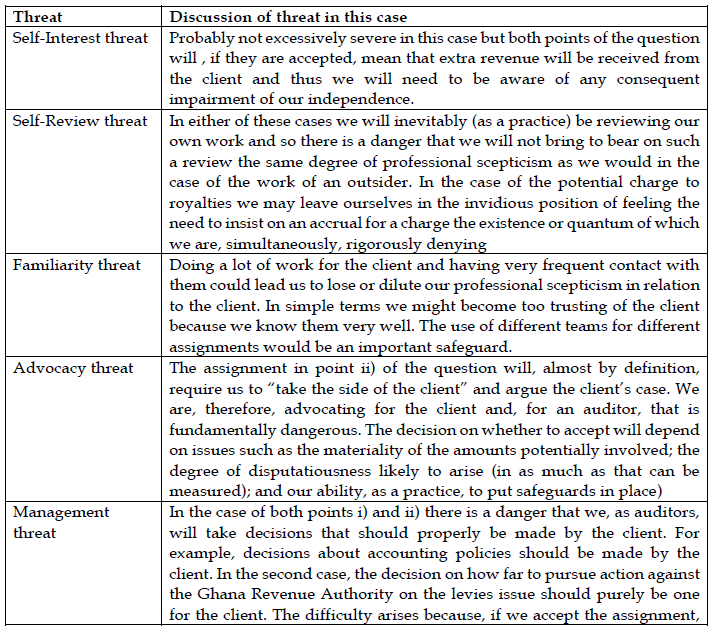May 2021 Q1 a.
Fundamental principles require that a member of a professional accountancy body behave with integrity in all professional, business, and financial relationships and strive for objectivity in all professional and business judgments. Objectivity can only be assured if the member is and is seen to be independent. Conflicts of interest have an essential bearing on independence and the public’s perception of the accounting profession’s integrity, objectivity, and independence.
The following scenario is a press report on a multinational firm of accountants:
The regulatory body directed a partner in a firm that he must resign because he was in breach of the regulatory body’s independence rules. His brother-in-law was the Financial Controller of an audit client. He was informed that the alternative was for him to move his home and place of work at least 400 miles from the client’s office, even though he was not the reporting partner. This made his job untenable. The accounting firm saw the regulatory body as ‘taking its rules to absurd lengths’. Shortly after this comment, the multinational firm announced proposals to split the firm into the following areas: audit, tax and business advisory services; management consultancy; and investment advisory services.
Required:
In relation to integrity, objectivity and independence, discuss the impact the above events may have on the public perception of the multinational firm of accountants. (10 marks)
View Solution
It is important that auditors are, and are seen to be, independent. Independence is at the heart of the auditing profession as auditors claim to give an impartial, objective opinion on the truth and fairness of the financial statements.
Objectivity
A family relationship between an auditor and the client can substantially affect the objectivity of the auditor, so auditors are advised not to build close personal relationships with audit clients and should not audit a company where a family member is employed in a capacity that is sensitive to the accounts, for example, in the finance department. However, this is not prohibited by law unless the auditor’s ‘partner’ is an employee of the company.
In this instance, the partner was not the reporting partner for the audit client in which his brother-in-law was a finance controller. According to generally accepted ethical practice, the firm appeared to be independent of the audit client if the related partner did not have anything to do with the audit.
Resolution
The regulatory body required the auditor to move 400 miles. This presumably implies that the partner was requested to change offices within the firm he employed. However, given current levels of computer networking and other communications common in business, this would appear to be an arbitrary distinction. As a partner in an office, Glasgow could have similar access, and influence over a single audit carried out by the firm as a partner in London.
Independence in appearance
However, in this situation, the regulatory body to be concerned that the public will not perceive the distinction between a partner and a partner who reports on a specific engagement. This may or may not be fair.
Arguably, it is only in publicising the problem that the public is likely to have a perception at all.
Also, given the comments made about modern communications above, the public is unlikely to be convinced that moving a staff member to a different office will solve this independence problem if they perceive that there is one.
Split of audit firm
The decision of the firm to split into three divisions could enhance the public perception of the independence of the audit department. While there might be underlying scepticism about the reasons behind the split (which could merely be for marketing purposes or to enable non-audit divisions to raise capital more efficiently), the underlying benefit for objectivity still exists. However, the move would respond to the requirements of the new Companies Act, 2019 (Act 992), which prohibits audit firms from offering other services to an audit client.


